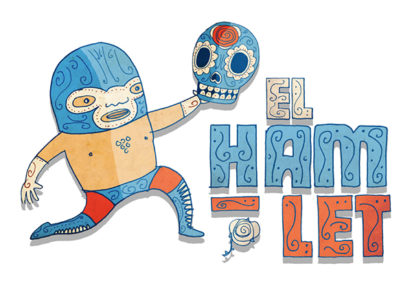¿Has escuchado hablar en spanglish? ¿Sabías siquiera que existe este tipo de habla?
El spanglish es un fenómeno lingüístico surgido en los sectores de población latina en EE.UU., se trata, como dice su nombre, de una fusión del español con el inglés, es una especie de jerga de uso muy extendido, un idioma híbrido de uso coloquial.
Su uso se extiende principalmente en California, Florida, Nuevo México, Texas y los barrios latinos de Nueva York.
De los cerca de 60 millones de latinos que hay en EE.UU (el grupo de mayor y más rápido crecimiento en ese país, aunque no le guste a Trump), una generosa porción lo usa diariamente. Es por lo tanto una fuerza lingüística importante en EE.UU.
Hasta ahora el uso del spanglish está mayormente supeditado a lo oral, y está en transición a su uso escrito. Se usa en radio, música y literatura. Lo usan políticos, abogados, profesores y sacerdotes.
Ya que su uso está tan masificado ¿Por qué no hacer traducciones en spanglish?
A esto mismo se ha dedicado Ilan Stavans, un intelectual, ensayistas, lexicógrafo y escritor judío estadounidense, nacido en México. Primero hizo una traducción del Quijote al spanglish y ahora es el turno de la inmortal obra de Shakespeare “Hamlet”. Para traducir esta obra introdujo variantes del spanglish, como la chicana, nuyorricana, dominicana y cubónica.
En palabras del traductor: “Shakespeare inventó unas 1.700 palabras, como “majestuoso”, “descontento” y “pedante”. Estoy convencido de que se hubiera sentido cautivado por la inventiva jazzística del spanglish”
Te dejamos con un fragmento de la traducción al spanglish de Hamlet, el príncipe de Dinamarca.

Acto 3, Scene Uno
Un room en el castle.
Entran KING, QUEEN, POLONIUS, OPHELIA, ROSENCRANTZ y GUILDENSTERN.
KING: And pueden ustedes, by no drift de circumstancia,
Get from él why he puts on esta confusión,
Grating so harshly todos sus días of quiet 5
Con turbulente y dangerous lunacía?
ROSENCRANTZ: He does confieza he siente himself distraído;
But from qué causa he will by no means hablar.
GUILDENSTERN: Nor lo encontramos listo to ser cuestionado be sounded,
Pero, with a crafty locura, keeps aloof, 10
When we would traer a él on to some confesión
Of his verdadero estado.
QUEEN: Los recibió well?
ROSENCRANTZ: Most como gentleman.
GUILDENSTERN: Pero with much forcing a ser cortéz. 15
ROSENCRANTZ: Avaro of question, pero de nuestras demandas
Most free en su respuesta.
QUEEN: Le preguntaron por
any pastime?
ROSENCRANTZ: Señora, it so fell out en ciertos actores 20
Que nosotros overtook en el camino; de estos we told him,
Y sí habái en él a kind of alegría
To hear sobre eso: they are about la corte,
And, como creo, they have already ordenado
Esta noche to play ante él. 25
POLONIUS: ’Tis most verdadero;
And he beseech’d me to entreat sus majestades
Para oír and ver the matter.
KING: With all my heart; and it doth much content me
Oirlo so inclin’d. 30
Buenos gentlemen, denle un further edge.
And drive su propósito on to these delights.
ROSENCRANTZ: Lo haremos, mi lord. [Exeunt ROSENCRANTZ y GUILDENSTERN.]
KING: Dulce Gertrude, déjanos too;
For we have closely sent for Hamlet hither, 35
That he, as ’twere por accidente, may here
Confrontar a Ophelia.
Su padre y myself, lawful observadores,
Will so esconder ourselves, that, ver, sin ser vistos,
We may de este encuentro frankly juzgar, 40
Y gather by him, as he is behav’d,
If ’t be la aflicción de su amor o no
That thus él sufre por ti.
QUEEN: Te obedeceré.
Y port u parte, Ophelia, I do wish 45
That your buenas bellezas be la cauza feliz
de Hamlet’s wildness; so shall I hope que tus virtudes
Will bring him to his normalidad again,
To both tus honores.
OPHELIA: Señora, así lo espero. [Exit QUEEN] 50
POLONIUS: Ophelia, caminas por acá. Gracious, so please you,
We will bestow ourselves. [A OPHELIA.] Lee en este libro;
That show of such an exercise may color
Tu soledad. We are oft to blame in this,
’Tis too much prov’d, that con apariencia piadosa 55
And acción piadosa we do endulzamos o’er
The diablo himself.
KING: [Aparte.] O! ’tis too true;
How smart a lash that speech doth give mi conciencia!
The harlot’s cheek, embellecida with plastering arte, 60
No es más feo to the thing that helps it
De lo que es mi deed a mi más painted palabra:
O burden pesada!
POLONIUS: Lo oigo venir; let’s withdraw, mi lord. [Exeunt KING y POLONIUS]
Entra HAMLET. 65
HAMLET: Ser, or not to ser: esa es la question.
Whether ’tis nobler sufrir en la mente
The slings y flechas of outrageous fortuna,
O tomar las arms against un mar de troubles,
Y al oponerlos end them? Morir, dormir, 70
No more, y, by domir to say que terminamos
The heart-ache y los mil natural shoques
Que la carne is heir to—’tis a consumación
Devoutly to be deseada. Morir, dormir;
Dormir, perchance soñar: ay, there’s el obstáculo: 75
For in that sueño of death what sueños may come
Cuando hemos shuffled off this coil mortal
Must darnos pausa. There’s el respecto
That makes calamidad of una vida tan larga:
For quién puede soportar the whips and scorns del tiempo, 80
El opresor’s wrong, the proud man’s contumely,
Los pangs of dispriz’d amor, the law’s retraso,
La insolencia of office, y los spurns
Que ameritan pacientemente the unworthy takes,
Cuando él mismo might his quietus make 85
Con a bare bodkin? who would fardels bear,
Gruñir y jurar under a weary vida,
But that the dread of algo después de la muerte,
The undiscover’d país de cuyo bourn
No viajero retorna, puzzles the will, 90
Y makes us rather bear esos males we have
Than fly a otros that we no conocemos?
Thus la conciencia does make cobardes de todos nosotros;
Y thus the native hue de la resolución
Is sicklied o’er con el pálido cast del pensamiento, 95
Y empresas de gran pith y moment
With este regard sus currents turn awry,
And lose el nombre de la acción. Soft you ahora!
The fair Ophelia! Nymph, in thy plegarias
Sean todos mis pecados remember’d. 100
OPHELIA: Bien mi lord,
Cómo está su honor for this many un día?
HAMLET: Te agradezco humildemente; well, well, well.
OPHELIA: Mi lord, tengo remembrances de usted,
Que por largo tiempo he querido to re-deliver; 105
Le ruego, now receive them.
HAMLET: No, no yo;
Nunca te di nada.
OPHELIA: Mi honor’d lord, usted sabe bien que lo hizo;
And, with them, palabras of so dulce breath compos’d 110
Que hicieron las cosas more rich: su perfume lost,
Take these again; for to la noble mente
Rich gifts wax poor when givers prove unkind.
There, mi lord.
HAMLET: Ha, ha! Eres casta? 115
OPHELIA: Mi lord!
HAMLET: Eres fair?
OPHELIA: Qué quiere decir mi lordship?
HAMLET: Que si eres casta y fair, tu castidad should admit no discurso de tu belleza.
OPHELIA: Puede la belleza, mi lord, tener mayor comercio que la castidad? 120
HAMLET: Ay, truly; pues el poder de la belleza will sooner transform castidad from what it is to a prostituta than la fuerza de la castidad can translate la belleza into su semejanza: this was sometime una paradoja, but now the time gives it una prueba. I did love thee una vez.
OPHELIA: Indeed, mi lord, me hiciste creerlo. 125
HAMLET: No debiste creerme; for virtue cannot so inocular our old stock but we shall relish of it: yo no te amé.
OPHELIA: I was the more engañada.
HAMLET: Get thee to a un convento: why wouldst usted be a breeder de pecados? I am myself casto indiferentemente; but yet podría acusarme of such things that it were 130 major que mi madre had not borne me. Soy muy orgulloso, revengeful, ambicioso; with más ofensas en my beck than I have pensamientos to put them in, imaginación to give them forma, or tiempo to act them in. What should such fellows como yo crawling entre la tierra y el cielo? Somos completamente knaves, all; no nos creas. Go thy ways al convento. Dónde está tu padre? 135
OPHELIA: En casa, mi lord.
HAMLET: Let las puertas be shut a él, that se comporte como un tonto nowhere pero en su propia casa. Adiós.
OPHELIA: O! help him, you dulces cielos!
HAMLET: If thou dost marry, I’ll give thee esta plaga for thy dowry: be thou as 140
chaste as ice, pura como la nieve, thou shalt not escape la calumnia. Get thee al convento, go; adiós. Or, if thou wilt needs casarse, cásese con un tonto; for wise men saben bien cuan monstrous usted los hace. Al convento, go; y rápido too. Adiós.
OPHELIA: O heavenly powers, restore him!
HAMLET: He oido de las aplicaciones de cosmético a tu cara too, well enough; 150
Dios hath given you una cara, and you make yourselves otra: you danza sugestivamente, you amble, and habla afectadamente, y nickname las criatures de Dios, and make your wantonness su ignorancia. Vayan, I’ll no more on ’t; it hath made me loco. I say, no tendremos más matrimonios; those that are married already, all but one, shall live; el resto quedarán como están. Al convento, go. [Exit]. 155
OPHELIA: O! what una noble mente is aquí o’erthrown:
ejemplo del courtier, el soldado, el scholar, ojo, lengua, espada;
Esta esperanza and rose of the fair state,
The glass of fashion and the mould of form,
El observado de todos los observadores, quite, quite down! 160
Y yo, of ladies más rechazado y wretched,
That suck’d la miel of his palabras musicales,
Ahora veo that noble y más soberana razón,
Like dulces campanas jangled, desentonadas and harsh;
That unmatch’d form and feature de la juventud gastada 170
Blasted con éxtasis: O! woe soy yo,
Haber visto lo que he visto, see lo que veo!
Re-entran KING y POLONIUS.
KING: Amor! sus afectaciones do not that way tend;
Nor what he spake, though it lack’d form un poco,
Was not como la locura. Hay algo en su alma 175
O’er which su melancolía sits on brood;
And, yo lo dudo, the hatch and the disclose
Will be de algun peligro; which for to prevent,
Tengo un quick determinación
Thus set it down: el debe with speed ir a Inglaterra, 180
Por la demanda of our neglected tributo:
Quizás the seas y países diferentes
Con objetos variables shall expel
This something-settled matter en su corazón,
Whereon sus sesos still beatinglo ponen thus 185
From fashion a sí mismo. Qué lo hace actuar abnormally?
POLONIUS: It shall do bien: but yet creo yo
The origin and commencement of his grief
Sprung de amor rechazado. How now, Ophelia!
No debes decirnos what Lord Hamlet dijo; 190
Lo escuchamos todo. Mi lord, haga como quiera;
But, if you hold it fit, después de la obra,
Let su reina madre all alone entreat him
Para mostrar his griefs: let her be round con él;
And I’ll be plac’d, so please you, in the ear 195
Of all their conferencia. If she find him not,
To Inglaterra mándalo, o confínalo where
Tu wisdom piense que sea prudente.
KING: It shall be así:
La locura in great ones no debe quedar unwatch’d. [Exeunt] 200
Fuente: http://lithub.com/











